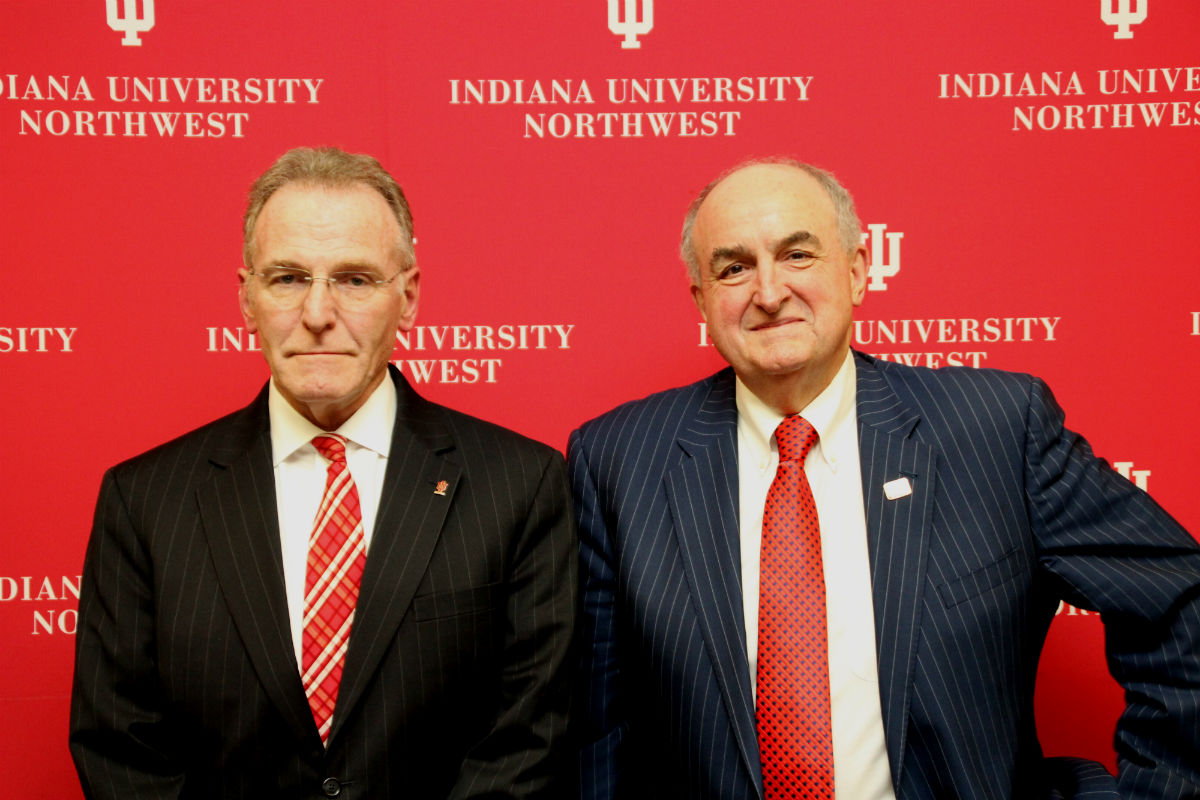Indiana University Northwest Chancellor, William Lowe, and Indiana University President, Michael McRobbie, convened on IUN’s campus this afternoon to discuss IU’s Bicentennial Priorities (IU’s strategic plan for growth) and how this plan will continue to build upon the strong relationships between IU, IUN, and the Northwest Indiana community.
Two of McRobbie and Lowe’s main points of the afternoon’s session dealt with the number of students that attend IU’s regional campuses, like IUN, and the priority of adapting these regional campuses to the regional careers of the students, who more often than not, stay in the campus’ community after graduation.
“If you look at all our students, about a third of our student population attend regional campuses,” McRobbie said. “On top of that, I want to say somewhere in the vicinity of 75-80% of those students settle down and stay in those regions. Clearly the regional campuses play a major role in the economic development of the areas they are in.”
IIMM asked if this unique aspect of students of regional campuses staying in their communities provided any extra incentive for these campuses to connect with the community.
“Yes it does, very much so,” McRobbie answered. “I think it’s very important for regional campuses to finely tune themselves to what the needs are of the communities they are in, and also to make assessments of where the community is going and what skills will be needed in the future.”
“Community-based enhancement is a strategic priority,” Chancellor Lowe added. “We stay very engaged with our community. One example, of many, is that our students and faculty, as part of their academic experience in 2014, contributed about 127,000 service hours.”
The community was also a focus during the discussion of whether there was a need to consider student housing as an option at IUN. And while student housing, per se, was something IU and IUN were open to assessing in the future, the current focus was on the city of Gary’s University Park Plan and the opportunities that it would open up to students for housing in the local area.
“The idea behind the University Park Plan is affordable housing and commercial development,” Lowe said. “When the University Park Plan gets some traction that would benefit the campus because students would be eligible to live in these affordable housing developments.”
One last main question that was widely-discussed was the topic of the Purdue consolidation in Northwest Indiana and if IUN has considered following suit. And while McRobbie and Lowe agreed that no plans for consolidation with any area schools were on the radar, they both stressed the importance of working together and building relationships with area schools to further enhance the experiences and opportunities at IUN.
“I think it’s unlikely that we would see anything substantial with regards to mergers,” explained McRobbie. “But what I do see is the need to continue to look for opportunities to coordinate and collaborate between institutions.”
McRobbie cited the construction of the new Arts and Sciences building on Broadway and 35th that will be shared with Ivy Tech Community College as one example of schools working together to build the community and the student experience.
McRobbie also expressed confidence in Lowe’s ability to continue strengthening the relationships between area schools in order to build a better educational foundation for Northwest Indiana students.
“Chancellor (Lowe), and his predecessor, have excellent relationships with the Purdue and Ivy Tech leadership.”
And while the questions focused on an breadth of topics surrounding IUN and its growth, one point remained constant at the roundtable: IUN is essential to building a better Northwest Indiana, and Indiana University remains steadfast in their commitment to helping IUN achieve that.
